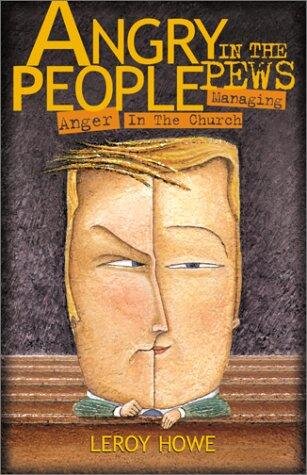Leroy T. Howe, Angry People in the Pews: Managing Anger in the Church. Judson Press, 2001.
Referenced in: Church Conflict – Criticism, Difficult People, Difficult Conservations
LifeandLeadership.com Summary
This is a unique volume discussing the place of anger among church members. It neither justifies nor demonizes this powerful emotion, but explains and illustrates how it manifests itself and how it can be dealt with responsibly. Howe discusses the theological and psychological roots of both destructive and constructive anger. He expounds on what scripture says and does not say about it, asking “Is there a ‘Christian’ face of anger?” Here he discusses the meaning of God’s anger as expressed in scripture:
Since God does not stifle anger, God does not demand that we stifle ours. Indeed from the standpoint of our faith, the capacity to feel anger is part of our very nature as created beings, one of our Creator’s most precious gifts to us. But God does not store up anger, nursing it so that it takes on a life of its own. God feels and expresses anger only when circumstances warrant doing so and then moves on. Allowing the created order to matter enough that God is significantly affected by the events that transpire in it, God makes the divine self vulnerable to the disappointment and betrayals that provide divine anger in the first place. The, God uses divine anger to motivate us when we offend, to recapture a lively sense of who we are in God’s sight and what God asks from us as those who bear the divine image in the world. (36)
He follows this with an overview of how and why we experience anger, believing that if we understand the process we can effectively control it toward expressing it more healthfully. Howe then offers concrete suggestions on how to deal with the many faces of anger we experience in everyday life, including grudges and paybacks. Next he discusses some of the more extreme expressions of fury, rage, and hate. The last chapter is devoted to providing support for those whose anger is in the service of truly righteous causes.
This is a substantive one-of-a-kind text. The chapters are well-organized, with a helpful discussion guide is at the end. Given the fact that all congregational conflict usually involves the expression of anger, this is an important resources for church leaders. It leads beyond reaction to having a more rational response to both the redemptive as well and destructive ways of dealing with situations that become emotionally charged.
From the Publisher
Written for both those who struggle with anger in their own lives and for caregivers who want to learn more about how to help angry people, Leroy Howe explores how unhealthy views of anger within the church have contributed to unhealthy ways of dealing with anger—the kind of anger that tears apart families, friendships, and people in the pews. Integrating biblical theology and tried-and-tested principles of counseling in exploring the dynamics of anger, Howe makes effective use of vignettes or case studies to provide realistic examples of how people deal with anger in their lives. Angry People in the Pews can be read for personal growth, it can serve as the basis for short courses on anger management, and it can be used in conjunction with training people for the ministry of lay pastoral care in Christian congregations.
About the Author
Leroy T. Howe is an ordained United Methodist minister and Professor emeritus of Pastoral Theology, Perkins School of Theology, Southern Methodist University. He is the editor of two books and author of seven, along with numerous articles and reviews in academic,professional,and general audience publications. Leroy and his wife, Nancy, live in Richardson, Texas and have two daughters and two grandchildren.
***For additional information on this resource, including reviews, click the bookstore links. Check the reference at page top or the links below for resource guides on related topics.***
Related Areas
See Other Resources on Church Conflict:
See Resources on Over 100 Areas of Ministry Leadership:


